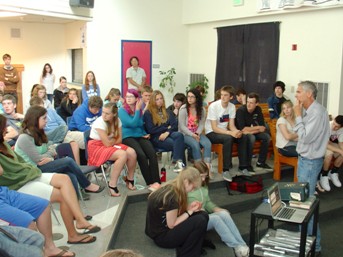— by Michael Riordan —
On Monday [May 19], over 100 students and teachers at Orcas Island High School were treated to a wide-ranging account of the search for life in Antarctica, on Mars and in other corners of the Solar System, given by Dr. Chris McKay, a leading planetary scientist from the NASA/Ames Research Center in Mountain View, Calif.
First he took them on a visual tour of Antarctica, which he’d visited 20 times over the past three decades, studying how bacteria and other forms of ordinary, earthbound life — what he calls Life 1.0 — can somehow survive under extremely cold, dry conditions. But that was just a warm-up tour for the main event: the search for Life 2.0 using the Mars Curiosity Rover under even more severe conditions on the red planet. Its experiments are now finding evidence for organic molecules on Mars, which could indicate that life existed on its surface eons ago.
Then McKay zoomed further out into the Solar System, to two moons of Saturn, Titan and Enceladus, other places where life might be lurking. A plume of water vapor spewing from the latter reveals a “soup” of organic molecules that has recently excited scientists; this is just what is needed for life to exist under its icy surface.
One of the best science communicators of his generation, perhaps better than Carl Sagan, McKay held Orcas kids spellbound for almost an hour and a half — including over half an hour in which they peppered him with questions. One he addressed was, “If we actually found another form of life in another world, what would we do about it?” Such a find would raise profound moral and philosophical issues, he said, that go beyond the proper realm of science.
Finally the bell rang and the kids returned to classes, and McKay headed for Eastsound Airport and a return flight to SeaTac. It had been a whirlwind 24-hour visit that featured a Sunday afternoon lecture at Orcas Center sponsored by the Orcas Crossroads Lecture Series. But perhaps because the weather was warm and sunny, only 85 islanders showed up to experience a similarly gripping presentation that many said was one of the best science lectures they’d ever witnessed. Maybe McKay will return one day with news of a big discovery.
**If you are reading theOrcasonian for free, thank your fellow islanders. If you would like to support theOrcasonian CLICK HERE to set your modestly-priced, voluntary subscription. Otherwise, no worries; we’re happy to share with you.**








